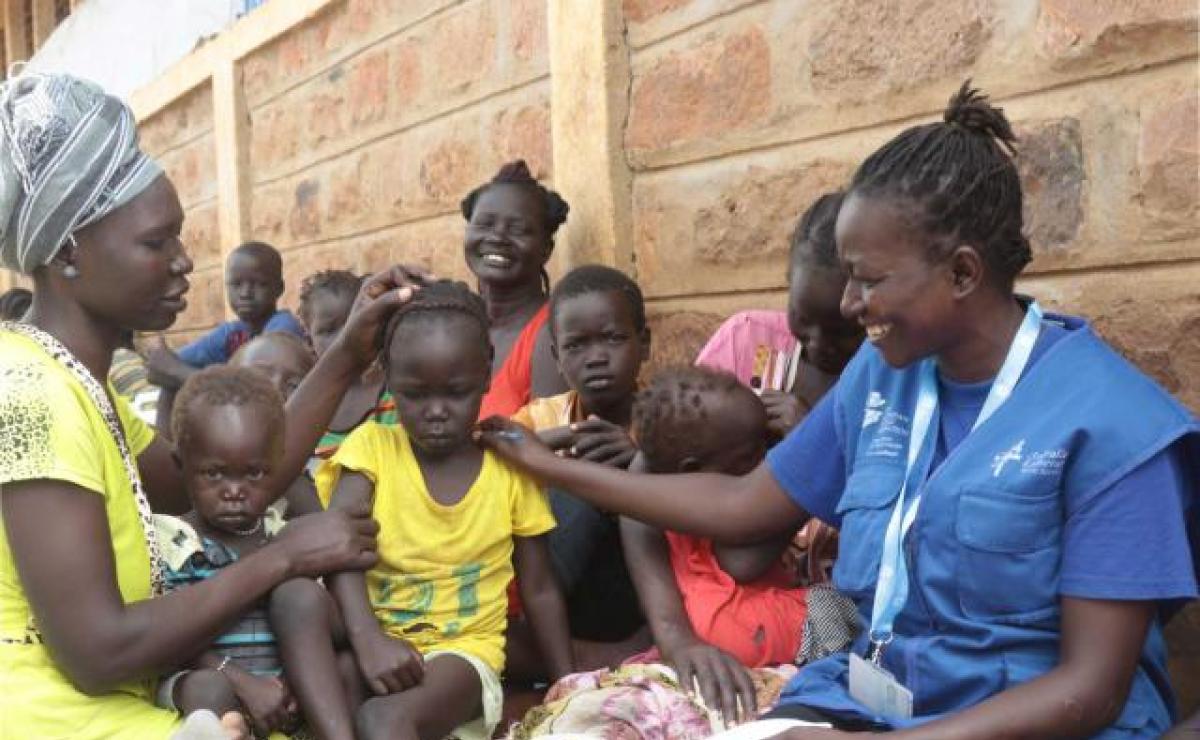Selfless service at the front line

Sarah Ewoi, Kenya, receives refugees from South Sudan
#WomenHumanitarians
(LWI) - 46-year-old Sarah Ewoi is a mother of 4, working for the Lutheran World Federation – World Service at the Nadapal Transit Centre in Kenya. The center is located just behind the border with South Sudan and the first point of contact for refugees of the South Sudanese civil war. As a social worker, Ewoi on some days receives hundreds of people who have fled violence and hunger.
She speaks 11 languages; English, Swahili, Turkana, Arabic, Tira, Toposa, Jie, Dinka, Didinga, Logir and French, most of them learnt informally over the years while working in Kenya, Sudan and South Sudan. Her journey in the humanitarian world began 16 years ago. For World Humanitarian day she shares what she experiences every day.
Walk us through a normal day at work.
I report to the office at 8:00am. My job starts with supervising the cleaning of the transit center. I then conduct psychosocial assessments of new arrivals, I explain to them what is expected of the refugees and asylum seekers during their stay at Nadapal. I also educate them on their rights and entitlements, conduct psychosocial first aid for survivors of sexual and gender-based violence then compile and send daily reports. I love the fact that everyday, I make a difference in the life of a person in need.
How do you connect with children, especially unaccompanied minors arriving at the transit center?
I’m able to speak their language; which quickly connects me to them, gain their trust and being a mother helps me create a home environment for them.
Is there a particular encounter in Nadapal that touched you?
Yes. I once met a 14-year-old girl who had run away from home when her parents wanted to marry her off to a 50-year-old man. The girl had been physically abused by her father and had fresh wounds all over her body after she declined to be married off. She then ran away, walked for 5 days, slept in the bushes with no food and water just to get to the transit center. She was rescued, cared for and is now pursuing her secondary school education. She wants to be a humanitarian lawyer in future.
As a frontline humanitarian worker at the busy transit center, how do you balance your time between caring for refugees and your own family?
I get Rest and Recuperation (RnR) leave every eight weeks. This ensures that I get adequate time to rest, unwind and spend time with my family. I thank God for a very supportive husband and a strong family system that often attends to my children while I am away. As a mother, it has been very hard being away from my children but I usually call them daily to check up on them, do homework with them and make the most out of the times I’m home with them during my RnR leave.
What does being a humanitarian mean to you?
I am a firm believer that refugees need care and support so that they can start their lives again. My role is to provide hope and a future. Here at Nadapal we are often caught in the crossfire between cattle raiders and security agencies. This scares me a lot and I always think of my children. It however does not stop me from serving refugees because if the roles were changed and we were the ones fleeing from war I would also want someone else to go out of their way to receive us, protect us and help us rebuild our lives.
What advice can you give to other women in humanitarian service?
As women humanitarian workers, I would like us to continue giving hope and motherly touch while serving at the frontline. We are the mothers and pillars of strength to the world.
I would like other women around the world to draw inspiration from my story of perseverance and resilience. On this day as we commemorate those that died in the line of humanitarian duty, we are stronger and more driven to go out there and save lives.
By Yvonne Baraza, LWF Kenya
